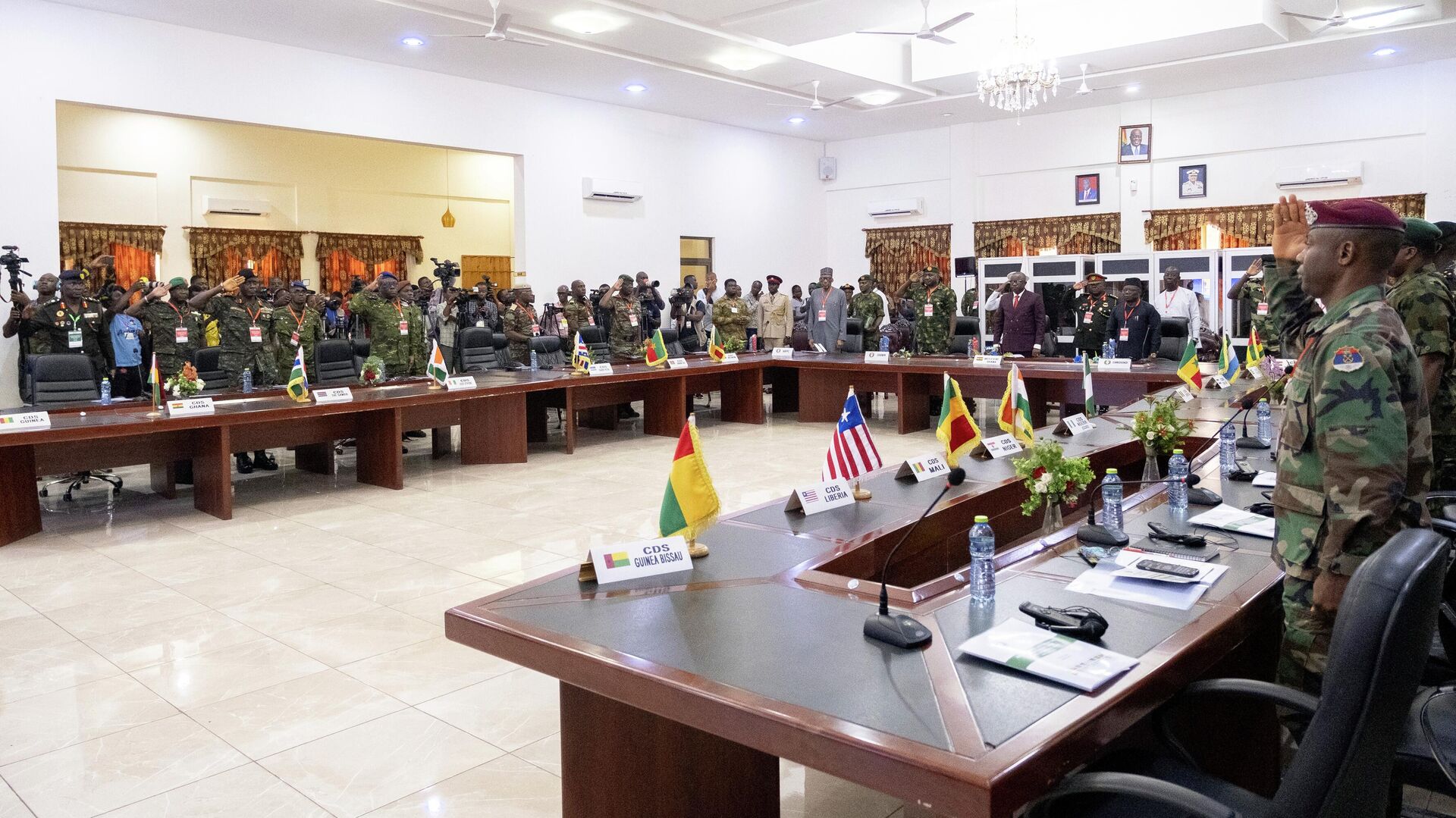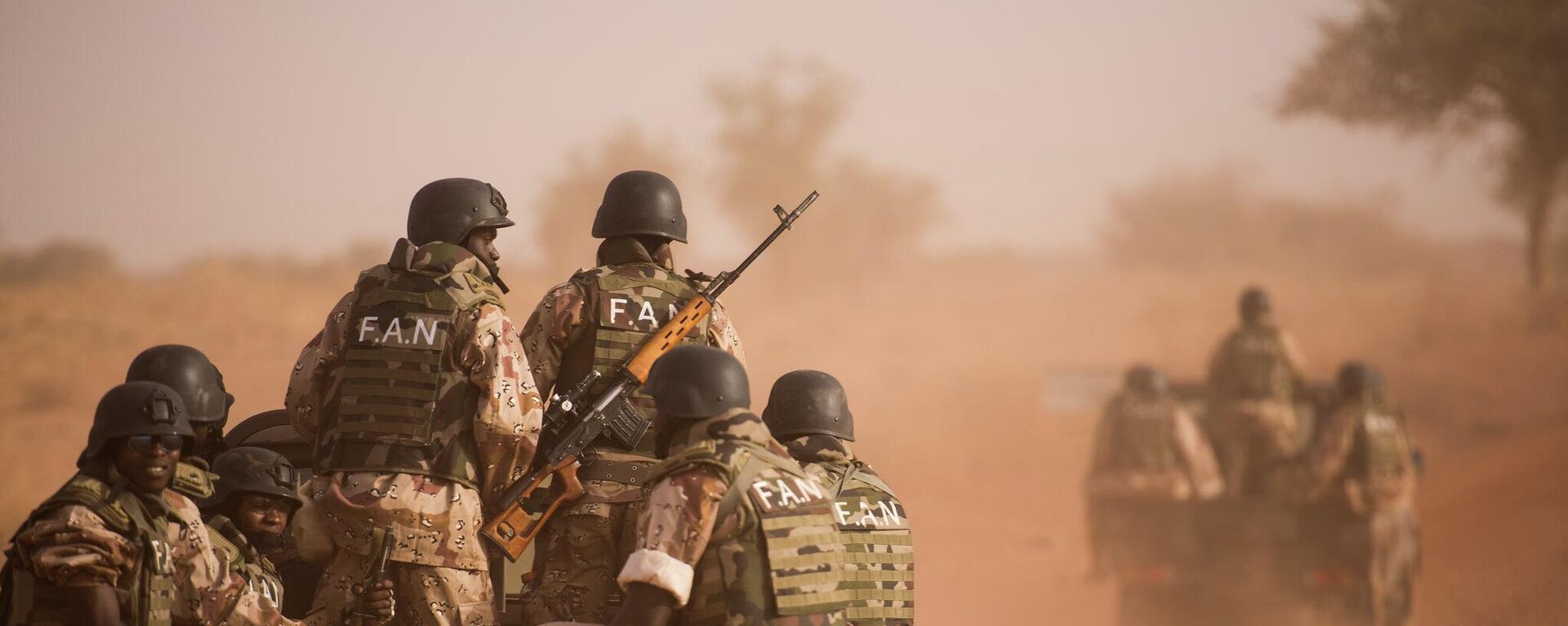https://en.sputniknews.africa/20230826/ecowas-vows-to-continue-to-use-diplomacy-to-resolve-crisis-in-niger-1061650742.html
ECOWAS Vows to Continue to Use Diplomacy to Resolve Crisis in Niger
ECOWAS Vows to Continue to Use Diplomacy to Resolve Crisis in Niger
Sputnik Africa
The Economic Community of West African States (ECOWAS) is committed to pursuing diplomatic means to restore the constitutional order in Niger, while not ruling... 26.08.2023, Sputnik Africa
2023-08-26T18:21+0200
2023-08-26T18:21+0200
2023-08-26T18:21+0200
situation in niger after military coup
niger
mohamed bazoum
west
economic community of west african states (ecowas)
mali
west africa
coup
military coup
burkina faso
https://cdn1.img.sputniknews.africa/img/07e7/08/12/1061422526_0:24:3558:2025_1920x0_80_0_0_b93c2a7c71b396d9faf0230da07687bc.jpg
This "hard but legitimate stance" can be explained by a string of coups in the region, with precedents in Mali, Guinea and Burkina Faso, ECOWAS Commission President Omar Alieu Touray was quoted as saying in the statement. Meanwhile, the rebel-appointed chief of staff, Moussa Salaou Barmou, reportedly ordered the Nigerien armed forces to be put on maximum alert amid threats of aggression against the country. A coup took place in Niger on July 26. President Mohamed Bazoum was ousted and detained by his own guard, led by Gen. Abdourahamane Tchiani. Following the coup, ECOWAS suspended all cooperation with Niger and threatened invasion if the coup leaders do not reinstate Bazoum. On August 18, ECOWAS Commissioner for Political Affairs Abdel-Fatau Musah said that ECOWAS general staff chiefs had agreed on a date for the beginning of military intervention, but would not make it public.
https://en.sputniknews.africa/20230826/nigers-chief-of-staff-orders-armed-forces-on-maximum-alert-1061642292.html
niger
west
mali
west africa
burkina faso
Sputnik Africa
feedback@sputniknews.com
+74956456601
MIA „Rossiya Segodnya“
2023
Sputnik Africa
feedback@sputniknews.com
+74956456601
MIA „Rossiya Segodnya“
News
en_EN
Sputnik Africa
feedback@sputniknews.com
+74956456601
MIA „Rossiya Segodnya“
Sputnik Africa
feedback@sputniknews.com
+74956456601
MIA „Rossiya Segodnya“
niger, mohamed bazoum, west, economic community of west african states (ecowas), mali, west africa, coup, military coup, burkina faso
niger, mohamed bazoum, west, economic community of west african states (ecowas), mali, west africa, coup, military coup, burkina faso
ECOWAS Vows to Continue to Use Diplomacy to Resolve Crisis in Niger
The Economic Community of West African States (ECOWAS) is committed to pursuing diplomatic means to restore the constitutional order in Niger, while not ruling out the use of force, according to the bloc's statement.
This "hard but legitimate stance" can be explained by a
string of coups in the region, with precedents in Mali, Guinea and Burkina Faso, ECOWAS Commission President Omar Alieu Touray was quoted as saying in the statement.
"The decision of the Heads of State and Government to activate the clause providing for the application of legitimate force in Niger was reached only after due consideration of how political dialogue alone has unfortunately failed to deter coup plotters in the region," Touray said, adding that the West African bloc had not declared war on Niger and that the decision to deploy a regional force was in line with the spirit of obligations under ECOWAS.
Meanwhile, the rebel-appointed chief of staff, Moussa Salaou Barmou, reportedly ordered the Nigerien armed forces to be put on maximum alert amid threats of aggression against the country.
A coup took place in Niger on July 26. President Mohamed Bazoum was ousted and detained by his own guard, led by Gen. Abdourahamane Tchiani. Following the coup, ECOWAS suspended all cooperation with Niger and threatened invasion if the coup leaders do not reinstate Bazoum. On August 18, ECOWAS Commissioner for Political Affairs Abdel-Fatau Musah said that ECOWAS general staff chiefs
had agreed on a date for the beginning of military intervention, but would not make it public.


